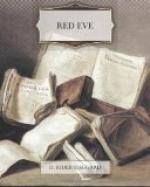“Ah!” said Grey Dick when he heard the news, “this is what comes of wasting arrows upon targets which should have been saved for traitors’ hearts! With those three hours of daylight in hand we’d have ringed the rogues in or run them down. Well, the devil’s will be done; he does but spare his own till a better day.”
But when the King heard the news he was very wroth, not with Hugh de Cressi, but with the burgesses of Dunwich, whose Mayor, although he was blameless, lost his office over the matter. Nor was there any other chosen afterward in his place, as those who read the records of that ancient port may discover for themselves.
When Master de Cressi and his people were gone, having first searched the great manor-house and found none in it save a few serving-men and women, whom he swore to put to death if they disobeyed him, Grey Dick raised the drawbridge. Then, all being made safe, he set a watch upon the walls and saw that there was wood in the iron cradle on the topmost tower in case it should be needful to light the beacon and bring aid. But it was not, since the sun rose before any dared to draw near those walls, and then those that came proved to be friendly folk from Dunwich bearing the ill news that the Frenchmen were clean away.
About midnight the door of the chamber in which Sir Andrew knelt by a bed whereon lay Hugh de Cressi opened and the tall Eve entered, bearing a taper in her hand. For now her mind had returned to her and she knew all.
“Is he dead, Father?” she asked in a small, strange voice; then, still as any statue, awaited the answer that was more to her than life.
“Nay, daughter. Down on your knees and give thanks. God, by the skill I gained in Eastern lands, has stayed the flow of his life’s blood, and I say that he will live.”
Then he showed her how her father’s sword had glanced from the short hood of chain-mail which he had given Hugh, stunning him, but leaving the skull unbroken. Biting into the neck below, it had severed the outer vein only. This he had tied with a thread of silk and burned with a hot iron, leaving a scar that Hugh bore to his death, but staunching the flow of blood.
“How know you that he will live?” asked Eve again, “seeing that he lies like one that is sped.”
“I know it, daughter. Question me no more. As for his stillness, it is that which follows a heavy blow. Perhaps it may hold him fast many days, since certainly he will be sick for long. Yet fear nothing; he will live.”
Now Eve uttered a great sigh. Her breast heaved and colour returned to her lips. She knelt down and gave thanks as the old priest-knight had bidden her. Then she rose, took his hand and kissed it.
“Yet one more question, Father,” she said. “It is of myself. That knave drugged me. I drank milk, and, save some dreams, remember no more till I heard Hugh’s voice calling. Now they tell me that I have stood at the altar with de Noyon, and that his priest read the mass of marriage over us, and—look! Oh! I never noted it till now—there is a ring upon my hand,” and she cast it on the floor. “Tell me, Father, according to the Church’s law is that man my—my husband?”




